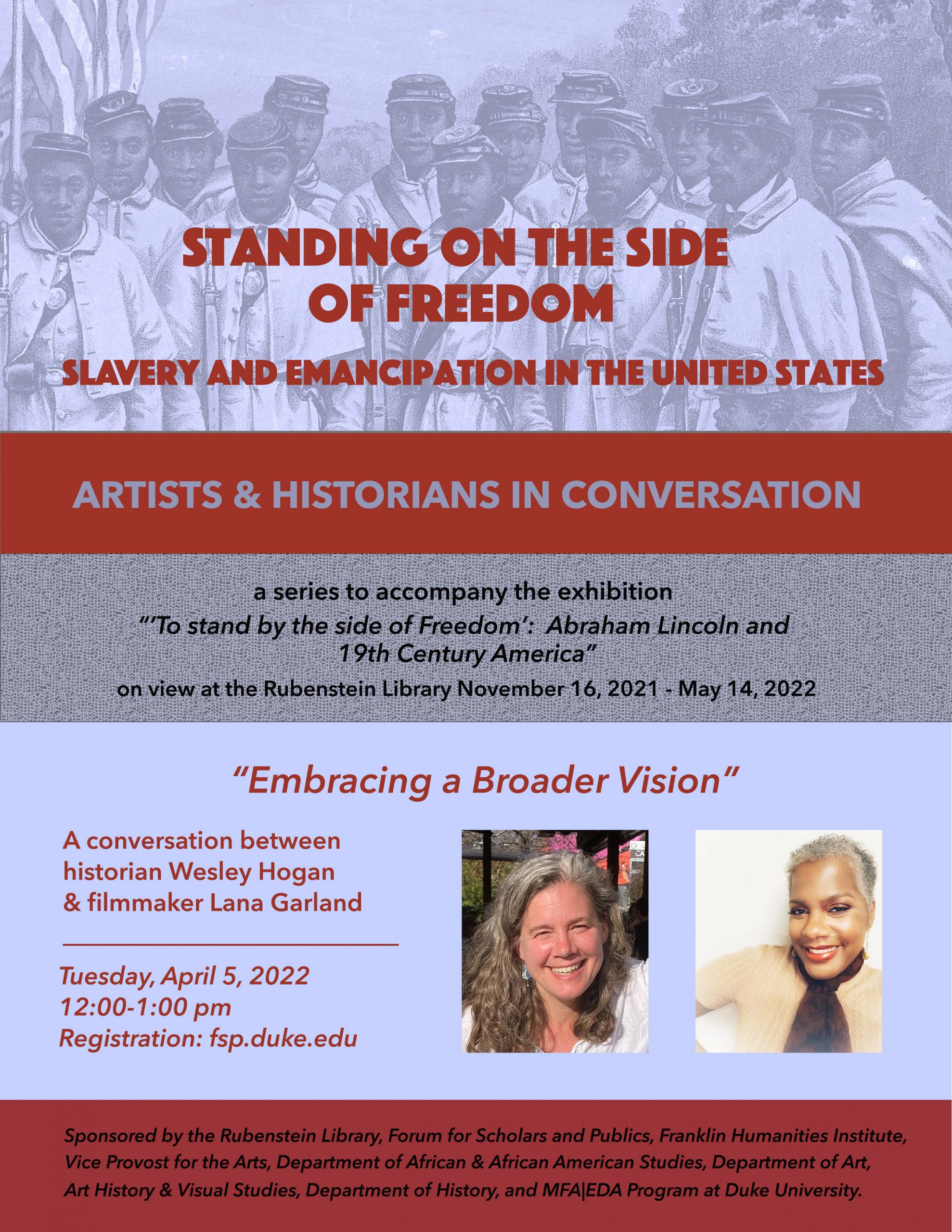Search
[wd_asp id=1]Embracing a broader vision
Embracing a broader vision
A conversation between historian Wesley Hogan and creator Lana Garland
Join us on Tuesday, April 5, at noon for an exploration of the role of art in creating knowledge and narratives about slavery, the Civil War, and freedom struggles in the United States. Historian Wesley Hogan will be in conversation with filmmaker, director, producer, and educator Lana Garland.
Among her many accomplishments, Lana Garland has been credited with turning Durham's Hayti Heritage Film Festival into a must-attend celebration of storytelling by Black filmmakers from the US South and throughout the African diaspora. Garland is recognized as a community builder who creates spaces for filmmakers and audiences to have conversations about the richness and diversity of Black life.
In a recent essay for Duke Arts reflecting on the life and vision of Harriet Tubman, Garland wrote, "[W]e must be willing to transition to a broader vision of ourselves. Like other species on the planet, our very existence hinges on our ability to evolve, lest we perish."
This event is part of a series accompanying the exhibition, "'To stand by the side of Freedom': Abraham Lincoln and 19th century America," on view at the Rubenstein Library through May 14, 2022.
This is a virtual event on Zoom. Free and open to the public. Advance registration required.
Sponsored by the Rubenstein Library, Forum for Scholars and Publics, Franklin Humanities Institute, Vice Provost for the Arts, Department of African & African American Studies, Department of Art, Art History & Visual Studies, Department of History, and MFA|EDA Program at Duke University.
Update October 24, 2022
The video from this event is now available on our YouTube channel. Read an excerpt from the conversation below.
Wesley Hogan: I just wonder if you might talk a little bit about how you see nature functioning in this wide body of work, screenwriting, filmmaking, the curation work?
Lana Garland: I think that this is something that I've arrived upon since moving to Durham in 2011. And so it's something that wasn't always there, but I definitely point back to kind of conversations of those who have been on this land. One of my teachers and dear friends, Justin Robinson, has taught me so much about the land and the connection between the people and the land. And so one thing I'm very, very clear of now is that there's been a breach, and that breach happened because of the trauma that we went through as a people through slavery and when the great migration happened and we left the South and we went to the North and beyond, we left that behind.
And I can remember conversations growing up about people either not wanting to be - Black people, family members and friends - not wanting to be out in nature. It was something kind of looked down upon. It was something that you should be afraid of, and people tease me because for the longest time, I never wanted to go camping.
And I feel like there is this thing that I can't shake regarding "Strange Fruit." That's why I don't camp. I feel I've got that information buried somewhere at the base of my cerebral cortex as Frances Cress Welsing says, where I feel what my ancestors went through in terms of the lynchings and the kind of juxtaposition of that beauty in nature and our demise, knowing the lick of the lash happened in these types of environments.
So at this point in time, there is a need, I believe for reclamation and that reclamation is happening because of climate change, it's happening because of food insecurity, it's happening because of housing insecurity.
View the full recording:
Artists & Historians in Conversation
Speakers
Lana Garland
Lana Garland’s creative practice centers on cultural memory restoration, particularly in the lives of African Americans. Working between narrative and documentary film forms, she tells stories with complex characters as she seeks to unearth the past to inform the future. Lana’s award-winning work as a creative director, producer, writer/director, and educator in television…...
Read MoreWesley Hogan
Duke University
Wesley Hogan is Research Professor at the Franklin Humanities Institute and History at Duke University. She writes and teaches the history of youth social movements, human rights, documentary, and oral history. Her most recent book, On the Freedom Side, draws a portrait of young people organizing in the spirit of…...
Read More

check us out
on social media